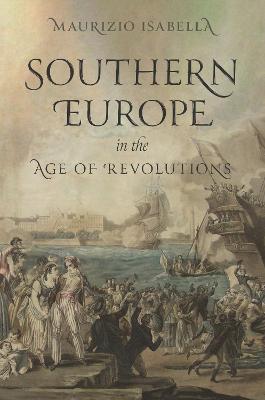Southern Europe in the Age of Revolutions

Southern Europe in the Age of Revolutions
An examination of revolutions in the Iberian and Italian peninsulas, Sicily and Greece in the 1820s that reveals a popular constitutional culture in the South
After the turbulent years of the Napoleonic Wars and the Congress of Vienna's attempt to guarantee peace and stability across Europe, a new revolutionary movement emerged in the southern peripheries of the continent. In this groundbreaking study, Maurizio Isabella examines the historical moment in the 1820s when a series of simultaneous uprisings took the quest for constitutional government to Portugal, Spain, the Italian peninsula, Sicily and Greece. Isabella places these events in a broader global revolutionary context and, decentering conventional narratives of the origins of political modernity, reveals the existence of an original popular constitutional culture in southern Europe. Isabella looks at the role played by secret societies, elections, petitions, protests and the experience of war as well as the circulation of information and individuals across seas and borders in politicising new sectors of society. By studying the mobilisation of the army, the clergy, artisans, rural communities and urban populations in favour of or against the revolutions, he shows that the uprisings in the South--although their ultimate fate was determined by the intervention of more powerful foreign countries--enjoyed considerable popular support in ideologically divided societies and led to the introduction of constitutions. Isabella argues that these movements informed the political life of Portugal and Spain for many decades and helped to forge a long-lasting revolutionary tradition in the Italian peninsula. The liberalism that emerged as a popular political force across southern Europe, he contends, was distinct from French and British varieties.PRP: 285.60 Lei
Acesta este Prețul Recomandat de Producător. Prețul de vânzare al produsului este afișat mai jos.
228.48Lei
228.48Lei
285.60 LeiLivrare in 2-4 saptamani
Descrierea produsului
An examination of revolutions in the Iberian and Italian peninsulas, Sicily and Greece in the 1820s that reveals a popular constitutional culture in the South
After the turbulent years of the Napoleonic Wars and the Congress of Vienna's attempt to guarantee peace and stability across Europe, a new revolutionary movement emerged in the southern peripheries of the continent. In this groundbreaking study, Maurizio Isabella examines the historical moment in the 1820s when a series of simultaneous uprisings took the quest for constitutional government to Portugal, Spain, the Italian peninsula, Sicily and Greece. Isabella places these events in a broader global revolutionary context and, decentering conventional narratives of the origins of political modernity, reveals the existence of an original popular constitutional culture in southern Europe. Isabella looks at the role played by secret societies, elections, petitions, protests and the experience of war as well as the circulation of information and individuals across seas and borders in politicising new sectors of society. By studying the mobilisation of the army, the clergy, artisans, rural communities and urban populations in favour of or against the revolutions, he shows that the uprisings in the South--although their ultimate fate was determined by the intervention of more powerful foreign countries--enjoyed considerable popular support in ideologically divided societies and led to the introduction of constitutions. Isabella argues that these movements informed the political life of Portugal and Spain for many decades and helped to forge a long-lasting revolutionary tradition in the Italian peninsula. The liberalism that emerged as a popular political force across southern Europe, he contends, was distinct from French and British varieties.Detaliile produsului









